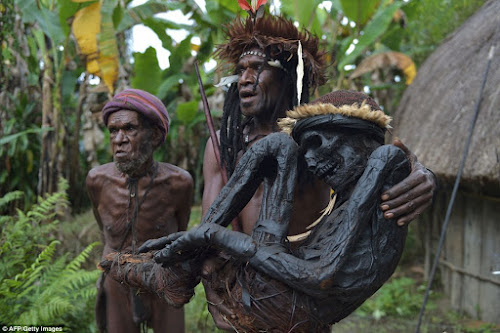04:30:00
Extraordinary
photos have emerged showing a tribe chief holding the perfectly
mummified remains of one of his ancestors in a remote Indonesian
village.
Dani
tribe chief Eli Mabel is pictured holding the remains of Agat Mamete
Mabel in the village of Wogi in Wamena in West Papua, an island in the
centre of Papua New Guinea.
The
indigenous tribe, who live in a remote area of the Papuan central
highlands, used to preserve their ancestors by smoking their bodies,
which kept them in a near-perfect state for hundreds of years.
The smoking
mummification is no longer practiced, but the Dani tribes people still
preserve a number of mummies as a symbol of their highest respect for
their ancestors.
In
recent years the Dani tribe has attracted tourists from around the
world, with some villages even showing their original customs and
holding mock wars.
Every
August the Dani hold mock battles with neighbouring tribes - the Lani
and Yali peoples - to celebrate the fertility and welfare of the Papua
province as well as upholding ancient traditions.
The people
of Baliem Valley, the Dani, Lani and Yali tribes, were discovered
accidentally by American zoologist and philanthropist Richard Archbold,
while on a zoological expedition to New Guinea in 1938.
In
the Dani tribe, the men wear distinctive tribal attire, including face
paint, feathers, animal bones and intricate penis sheaths named Koteka.
The women wear skirts made from woven orchid fibres decorated with straw and woven bags, worn from the head, named 'noken'.















































0 Comment:
Post a Comment